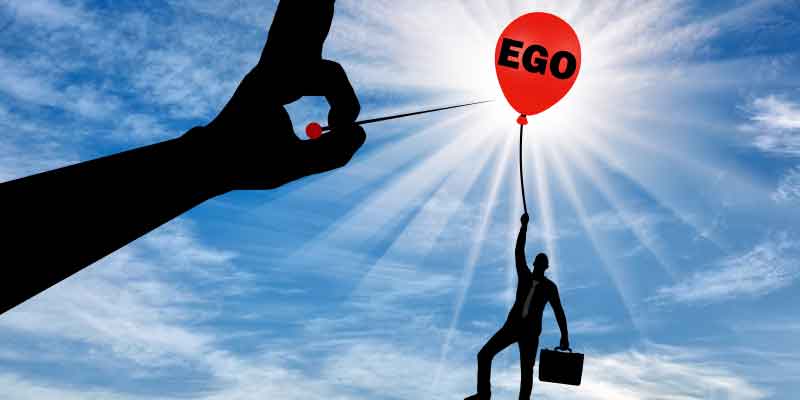Being successful is great. But having a big ego can be a detriment to that success. Here are 13 costs of a big ego.
Weak relationships. People with big egos can be condescending, rude, and disrespectful. Their nastiness can suck the oxygen out of a room.
Shallow connections. It’s hard to build deep, trusting relationships when people dominate conversations, spend little time listening, and are totally self-absorbed.
Inadequate knowledge. People who think they know it all are more likely to stagnate because they undervalue the importance of acquiring knowledge.
Blind to weaknesses. People who reject feedback are more likely to repeat mistakes because they’re totally blind to their flaws. In fact, ego can obstruct a necessary course correction and lead to failure.
Ineffective decision making. People with huge egos rarely seek advice from others — because they know better. They’re more inclined to make decisions from a limited perspective.
Dangerous complacency. People with egos think they’ll always remain on top. They rarely glance over their shoulder to see if competitors are gaining ground.
Poor image. People who blow their own horn, talk down to people, and make fun of the less fortunate are likely to develop a poor reputation.
Mediocre career advancement. People with big egos are unwilling to start at the bottom; they turn down work that’s “beneath them” and refuse to be told what to do. Then they wonder why they’re passed over for promotions.
Wrong partners. When people have an inflated view of themselves or their organization, they’re more inclined to squeeze partners than to create win-win relationships.
Loneliness. People who think they’re above it all consciously separate themselves from others. This can lead to a lonely existence.
Ineffective leadership. Effective leaders build and exude confidence while keeping their ego in check. When leaders squash input, hoard the credit, and put people down, it can — and usually does — dampen the effectiveness of a team.
Increased stress. When people feel they have something to prove and always have to be right, it adds a lot of stress.
Distorted self-image. People with large egos measure self-worth based on what they’ve gained rather than what they’ve given back. That can distort their values and skew their priorities.
Do You Have a Big Ego?
Please leave a comment and tell us what you think or share it with someone who can benefit from the information.
Additional Reading:
Is Your Confidence Turning Into Egotism?
Be Humble: Don’t Let Success Go to Your Head
Complacency: The Enemy of Success
It’s Time for Grown-Ups to Grow Up
Counterfeit Leadership
If you like this article, subscribe to our blog so that you don’t miss a single post. Get future posts by RSS feed, email or Facebook. It’s FREE.






In these times when relationships are so friable managing and handling ego need of the hour .Follow your posts regularly they are so helpful .
Thanks Jugdiep. I’m glad you like it 🙂
Humility is a sign of strength, not weakness. People with humility possess an inner peace. They’re modest about their achievements, grounded in their values, and they have nothing to prove to others. They’re down to earth, comfortable in their own skin, and quietly proud. Humble people shift their focus from taking to giving, from talking about themselves to listening to others, from hoarding the credit to deflecting the praise, and from being a ‘know-it-all’ to knowing there’s so much more in life worth learning. There’s no ego, no pretense, and certainly no gamesmanship. So refreshing!!!
Thanks for taking the time to write.
Best,
Frank